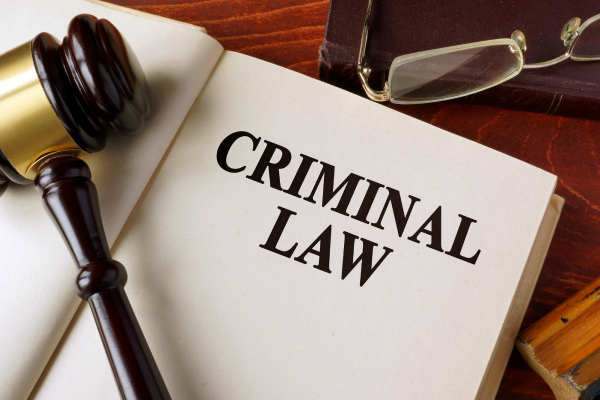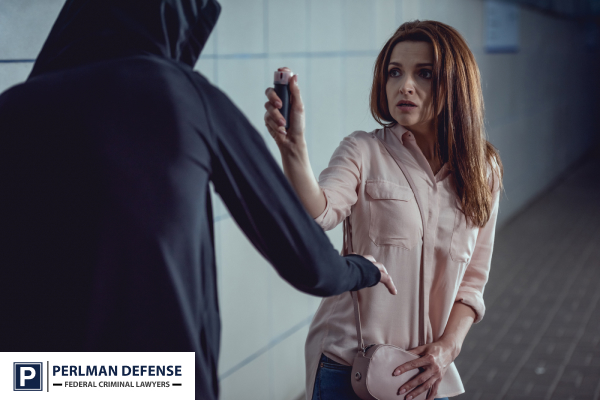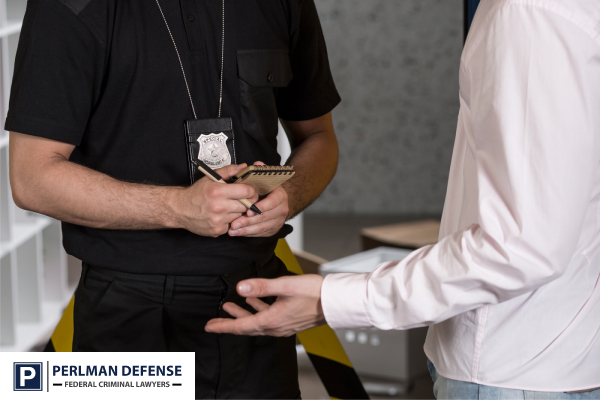
When someone faces criminal charges, they often rely on criminal defenses to prove their innocence or justify their actions. These criminal defenses are strategies criminal defense lawyers use to challenge the prosecution's claims.
While pleading innocent may appear to be the most basic self-defense, you and your attorney must do more than just take the witness stand and declare you are not guilty.
The four main criminal defenses include self-defense, the insanity defense, common constitutional violations, and proving innocence through methods like alibis or showing mistakes in identity. Understanding these defenses helps to see how defendants might avoid a guilty verdict.
Each defense has its own set of rules and criteria that must be met to be successful in court. A good criminal defense attorney knows how to use these common defenses effectively, often deciding based on the case's specifics.
At Perlman Defense Federal Criminal Lawyers, we will customize your defense strategy to match your case.

Self-defense is a legal strategy used when someone believes they must protect themselves from imminent harm. This defense justifies the use of force if it is required to prevent serious harm or death.
Lawyers often argue that their clients had no choice but to act as they did, making it a critical part of the defense in violent crime cases.
In court, demonstrating that the defendant committed force for self-defense involves showing that the threat was real and immediate. The force used must also be reasonable and not excessive compared to the threat faced.
The prosecution must establish your guilt beyond a reasonable doubt, but don't fret- you and your lawyer should concentrate on providing as much evidence and expert testimony as possible to demonstrate your innocence.
The law allows people to use force in self-defense if needed to prevent harm to themselves or others. This means that the person must genuinely believe that they or someone else is in immediate danger, and the force used must match the threat level.
For example, if an attacker threatens another person with a weapon, the law typically recognizes the right to use force in defense. However, this force must not exceed what would reasonably protect the threatened individual. The idea is to stop the harm, not to retaliate or cause unnecessary injury.
Furthermore, the situation must not allow for safer alternatives. If the threatened person could have safely retreated or called for help, using force might not be justified. Courts examine these scenarios closely to ensure that the use of force is truly needed.
The insanity defense is a complex legal strategy used when a defendant claims they were not in a stable mental state at the time of the crime. This defense argues that due to a severe mental illness, the defendant was unable to understand the nature or wrongfulness of their actions. It shifts the focus from the crime itself to the mental condition of the accused.
This defense requires substantial evidence, including expert psychiatric testimony. The aim is to show that the mental disorder highly impaired the defendant's ability to function normally.
If successful, this may lead to a verdict of not guilty because of insanity, which can result in commitment to a mental health facility rather than a prison.
To establish a compelling insanity defense, the defense must present clear evidence of mental illness.
It involves demonstrating through medical records, expert evaluations, and witness testimony that the defendant was suffering from a considerable mental health issue at the crime's time. The illness must be severe enough to impair judgment or prevent understanding right from wrong.
In addition, the defense must show that the mental illness was directly related to the criminal behavior. This link is important for convincing the court that the defendant's actions were a direct outcome of their psychiatric condition and not just a coincidental factor.
Lastly, there needs to be a thorough examination of the defendant's mental state close to the time of the crime. This often includes psychiatric evaluations conducted both before and after the incident to provide a clear picture of the individual's mental health over time.

Constitutional violations occur when law enforcement or other government entities infringe upon the rights guaranteed to individuals by the U.S. Constitution.
This can include illegal searches and seizing evidence, coerced confessions, or denying a fair trial. These violations can form a strong basis for defense, arguing that the evidence against the defendant is invalid or that their rights were compromised.
Defendants and their lawyers can challenge the admissibility of evidence obtained through constitutional violations.
If successful, this may lead to a reduction in charges or even dismissal of the case. Highlighting these issues is vital for ensuring that the defendant receives a fair trial as mandated by law.
Proving a constitutional violation requires showing that the defendant's rights were clearly violated during the criminal justice process. This often involves detailed knowledge of law and precedent, making the assistance of an experienced criminal defense lawyer vital.
As a defendant facing criminal charges, you have the right to defend yourself against the allegations. The prosecutor must prove charges beyond a reasonable doubt, and a defense strategy might challenge or limit the prosecutor's case, provide legal justification for the defendant's conduct, and more.
Lastly, even if a violation is proven, the defense must show that it notably impacted the case's outcome. This means demonstrating that the trial's result might have been different without the violation, which can be a high threshold to meet.

Innocence is the most straightforward defense— the defendant asserts that the defendant did not commit the crime. Lawyers may use various strategies. These include as presenting alibis or pointing out mistakes when identifying the perpetrator. Proving innocence often involves clearing up misunderstandings or incorrect assumptions. These can lead to a wrongful accusation.
In these cases, it is important to demonstrate that the evidence does not link the defendant to the crime. This could involve forensic analysis, witness testimony, or surveillance footage.
A strong defense shows that the prosecution cannot prove the defendant's guilt beyond a reasonable doubt, which is essential for a not-guilty verdict.
An alibi defense means proving the defendant was elsewhere when the crime occurred. This requires reliable evidence such as witness statements, receipts, or video footage. We could show you were at a different location. An effective alibi can strongly support a claim of innocence.
Furthermore, criminal defenses must ensure that the alibi is solid and contradictions-free. Any discrepancies can undermine the alibi's credibility and weaken the defense. It is also helpful if the alibi is backed up by multiple sources, adding weight to the defendant's claim of being elsewhere.
Mistaken identity is a common issue in criminal cases. Defense lawyers work to show that witnesses or victims incorrectly identified their client. This can involve highlighting flaws in the identification process. These include poor lighting, brief encounters, or suggestive police lineups.
Psychological factors like stress or fear can make it hard to identify a suspect. Defense teams often use expert testimony on eyewitness reliability. This challenges the prosecution's evidence.
Proving mistaken identity means casting doubt about the defendant's presence at the crime scene. Let us choose the right criminal defenses for your case. Contact us for a vigorous legal defense.

Presenting persuasive legal defenses in criminal court is highly complicated, and there is a lot at stake. Choosing the right criminal defense lawyer is needed for anyone facing criminal charges. Perlman Defense Federal Criminal Lawyers have a strong track record. We defend clients effectively using a variety of legal defenses.
We also customize your defense strategy to meet your needs and seek to cast doubt in the minds of the jurors. This makes it hard for the prosecution to prove your case beyond a reasonable doubt.
Is an affirmative defense right for you? Contact our criminal defense attorneys today to schedule a free case consultation.
Request Your
Confidential Consultation
Fill out the contact form or call us at (818) 383-6692 to schedule your free consultation.
"*" indicates required fields